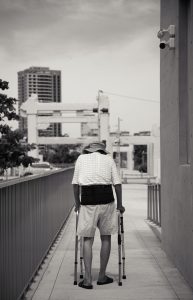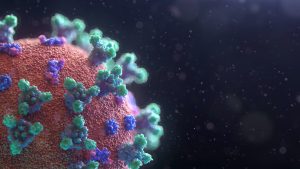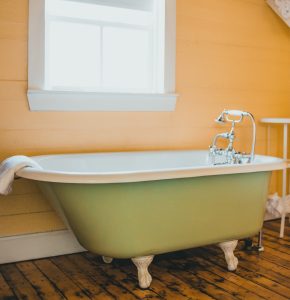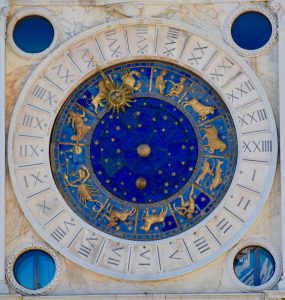Migraines & Headaches
The “Unresolved Exterior Pathogen”

I think one of my favorite concepts in Chinese Medicine is that of the “unresolved exterior pathogen.” What does it mean? When we catch a cold, whether bacterial or viral, most cases should be vented, sweated out, while we rest as much as possible and consume warm foods, such as the classic chicken soup to support our “wei qi,” or immunological cellular energy.
Obviously most modern people do not do this. We take over-the-counter cough suppressants, congestion suppressants, anti-pyretics, and every other suppressant to make us feel as comfortable as possible until the cold resolves… or at least appears to.
This is a totally understandable mistake. First of all, most people don’t know that Chinese Medicine can treat the common cold (along with nearly everything else under the sun), and even if they did herbalists and herbal medicine are not readily available to most.
From a Chinese Medical perspective when a cold is suppressed it gets pushed deeper into the body, from the “wei qi” or immunological layer, to the organs and metabolic layer. Anyone have digestive issues since having Covid-19? This is an “unresolved exterior.”
More common symptoms of unresolved pathogens include rheumatological, dermatological, or orthopedic; autoimmune joint pain being the most self-explanatory, which makes orthopedics not far behind it. Lingering “dampness,” residual plaques or mucus from an exterior pathogen go latent, and if we’re lucky enough that they don’t create the kind of molecular mimicry to over-activate our immune system they may lodge into our muscles, tendons, and ligaments. While neck and back pain during a common cold are well-known, pay more attention to such symptoms that linger in their wake. It usually indicates fluids that should have been sweated out are trapped wherever we happen to be orthopedically most vulnerable.
Thankfully, we’ve gotten to a point where few people are any longer terrified or paralyzed by Covid-19. Most of us are more or less going about our lives taking varying precautions—this doesn’t mean we cannot at the same time respect our opponent.
After I had Covid I continued to consult and get treated by mentors for at least one month after symptoms resolved, with the obvious intention of prevention and full resolution, not just from a biomedical standpoint, but from a more neurotic, perfectionist Chinese Medical assessment. I wanted to ensure that my tongue looked like my tongue again—also that we took steps to avoid any of my own constitutional proclivities from rearing their heads as a result of any unresolved inflammation.
While going through Chinese Medical school it was fascinating to think that my eczema and ski conditions that I’d had all my life may have been a result of an improperly treated cold I had as a baby. Or to view my low back or knee pain as not something relegated exclusively to the orthopedic surface and/or old athletic injuries, but connected to my systemic inflammation. I beg your pardon for my broken record tendency in refutal of one my greatest pet peeves:
“Holistic” does not mean everything alternative, “New Agey,” nor related to spa treatments, nor gentle or weaker than biomedicine. It means analyzing all symptoms and systems as interconnected and the incredibly more challenging task of treating accordingly.
To schedule a FREE INITIAL CONSULTATION CLICK HERE
My Own Covid Story

When my wife texted me two Friday nights ago that she’d had a persistent cough throughout the day, juxtaposed to the emoji for concern and/or terror, I was unperturbed. Over the course of the now close to three years into this pandemic, we’d both seen this play enacted by one another many times over. A cough, a headache, a tickle in the throat or oddly stubborn congestion, and like any typical urban, Jewish medical professionals we immediately grasped for one of our many rapid Covid tests in the closet, crossed our fingers, and hoped for the best; and were always rewarded as such—that was up until last week.
My wife continued to test negative for her first 24 hours, even as symptoms were worsening: Headache, body aches, fatigue, all to the severity that she figured if not covid it must have been the flu. Regardless of the biomedical disease label, her Chinese medical pattern was her Chinese medical pattern, so I dutifully drove to the pharmacy in Chinatown to get her what I hoped was the perfect formula. By the 48th hour she tested positive, just at around the same time she’d begin her herbs and self-quarantine. We only hoped it wasn’t too late for the baby and me.
I felt fine for another two days, playing Super-Dad, cooking all meals plus Chinese herbs, caring for the baby, and leaving meals on the floor outside of the dreaded infected room. Unfortunately, once woken in the night, our 15-month-old refuses to return to sleep without the comforts only Mom can provide. They ended up spending the night together and within another 48 hours I had a tickle in my throat so subtle that three years ago, or even three days ago I would have thought nothing of it. A mild cough that could have just as easily been the kind of mild seasonal allergy symptom exhibited by those of us lucky enough to not much suffer with seasonal allergies. Hoping against hope that maybe it was psychosomatic or even a stretch of a coincidence, but within six hours I was writhing on my bed with a 100.4 fever (not terrible), plus a cough and rather heated oppression in the chest. Still testing negative, but immediately emailed one of my mentors for a virtual consultation the following morning.
My first twelve hours were rather awful: One of the worst occipital headaches I’d ever experienced, low back pain that was reminiscent of after my Covid vaccine, and a queasy lack of appetite that is as foreign to my own constitution as it is to most common colds. Covid’s unique strength is in the sticky nature of the spike protein, “damp” as we’d coin it in Chinese medicine, obviously evidenced in its well-known cerebrovascular and gastrointestinal complications, as well as brain fog, which can all be explained by either modern psychoneuroimmunology and/or good old fashioned, Chinese medicine. The muscle aches, for example, are the excess body fluids on the surface fighting the pathogen but temporarily losing, as is apparent by the lack of sweat I was still experiencing.
My brother was my angel, kind enough to use his free time to run to Chinatown for me, pick up the formula written by my mentor, and drop it off at my building, so that I wouldn’t lose a day. Covid is the kind of disease that evolves rapidly, entering the body at one “organ level” but quickly traversing to the next if not immediately and appropriately addressed. My brother understands just enough about Chinese medicine to know this logic, so I needn’t explain to him the urgency, in spite of well knowing mine was not an “urgent” case by biomedical standards.
By this time my wife was 80% better, the baby practically asymptomatic aside from some odd eating and sleeping habits. I felt much better by my 24-hour mark, though my “pattern” did shift, as the headache and muscle aches had abated and I was left with a burning sore throat. I called my mentor for another consultation, as we had to change the formula, this time with an intention of clearing heat from the lungs. Once that was clear I was finally left with a low-grade brain fog for a few days, which was resolved with formula #3, a return to more aromatic herbs to dry the leftover fluid retention in the gut. No, I did not request my brother make any more trips to Chinatown, as I felt up to driving in myself, requesting they bring my bag of herbs outside to exchange safely on the sidewalk.
All told, it was approximately a one-week process for myself, probably a bit shorter for my wife, and a lot shorter for the baby, and I thought it all too appropriate to not share, doing what I do for a living, and this all having fallen the week before Thanksgiving.
We have much to be grateful for through this experience, first and foremost of course being our health and full recovery. While I realize the majority of the western world has been “over this” for quite some time, and the present variant is supposedly mild, I suspect the latter hypothesis to be applicable mostly to those who are on their second or third times around. For our household this was our first—we were naïve enough to believe we might even evade it—and although we managed, it was no fun going through it with a 1-year-old. Though we made it through, and to this end my primary gratitude goes to Kamwo Pharmacy, of course my brother, and Chinese medicine in general; while the western world continues to box acupuncture in as some nifty new age modality to treat muscle pains, at its inception it is the most thoughtful form of internal medicine, and all of its classical literature is more or less wholly dedicated to illnesses like coronavirus. I hope should any of you contract it in the future you’ll allow me to help first.
What Causes Disease? Something New or Something Old?

A common question from health care providers to patients during initial intakes around the inception of their chief complaint is: “Did anything new happen or significantly change in your life just before this started?”
If we are looking at an orthopedic issue this might be in suggestion to some physical trauma or accident. If the issue is more psychological, we’re inquiring clearly more around emotional trauma or incident. Either way, no matter the medical paradigm it is always helpful to know what, if anything, was the final straw, and/or only straw, to induce a present pathology.
Where medicine gets tricky is in approximately half of the times when the patient responds: “Nothing… nothing changed.” Nothing new or bad happened.
In this case it is logical to look at genetic tendencies finally rearing latent heads, but I am more inclined to examine patient habits and lifestyles finally catching up to them. Everyone knows that a few cigarettes, or even a few years of cigarettes, do not cause chronic illness, so why should a short or even medium interim of any harmful pattern under the umbrella of self-care?
How many years does it take for a lack of exercise to cause disease? How many years does it take for nightly desserts, social alcohol use, or haphazard use of pharmaceuticals to?
“The last straw(s)” is an etiology which poses a greater challenge to patients’ self-awareness, curiosity, and/or open-mindedness. Being confronted with what we might have been doing wrong for years, if not decades—where our responsibility lies—poses a threat to our ego, our belief systems, as well as our simple energy in its implicit requisite of critical thought, experimentation, and will power to examine what we could/should change. Nevertheless, scientific logic would dictate this to be at least one irrefutable contributing factor to disease.
When “nothing changed” just prior to onset of symptoms, what percentage of causality can we intelligently assign to genetics alone? Thirty percent? Sixty? Maybe ninety on occasion? I am skeptical it is very often 100%, lest I would personally be relegated to medications for gout disease, eczema, and an anxiety disorder.
I recommend to all patients, myself included, to be open, to the idea that although we probably haven’t been wrong about everything, we are just as likely wrong about some of the things we do, especially whilst in the context of seeking help.
Please don’t get me wrong: As much of a pet peeve it is for me to work with patients who take no responsibility for their conditions and/or wield a particularly narrow-minded arrogance around the infallibility of their choices, it is equally unacceptable when health care providers put the entire onus on the patient. The healing process, in my opinion, is not only a marathon-like process of scientific experimentation, but a team process, that usually requires approximately half of contribution from both parties. I’ve heard many colleagues criticize patients’ desire for us to “fix them.” Obviously, I agree, people must take responsibility for their health. At the same time, most chronic conditions need the outside support and help from professionals as well.
Shower Clogs and Chinese Medicine

One of the recurrent flaws in our Jersey City apartment of the past few years has been the plumbing. Within months after moving here we had an inexplicable leak from the kitchen sink that forced management to have to tear up and replace the living room flooring. Of course, my neurosis coupled with faith in ongoing communication from the subjective realm diagnosed this as a sure sign from the universe (and my own spirit guides) that leaving New York City was the wrong decision. My wife on the other hand diagnosed it as a plumbing crisis.
More chronic at home has been our need to regularly flush out the shower drains, and each time we do so we’re sure to use not just hot water, but a pot of boiling water to chase the Liquid Plumr or whichever product my wife deems most ideal to unstick the grime and/or hairs that cause the clogs. It reminded me of one of the most important principles in Chinese medicine, the diet, and lifestyle we encourage of human beings.
Grime or accumulation in pipes is no different in theory than “dampness,” dysbiosis, or plaques in human vessels, arteries, and pathways. Call it what you will—any of the aforementioned, otherwise inflammation or fluid retention, ultimately all paradigms of medicine can consistently observe and cite such blockages as the underlying etiologies to most diseases.
This is why Eastern medicine discourages our consumption of anything and everything cold. Whether cold drinks, cold foods, such as salads, yogurts, or smoothies, or using ice on injuries, cold constricts and solidifies accumulations instead of dissolving them, thereby making such substances counterintuitive to our perpetual intention to reduce inflammation.
Cold foods are often yummy and convenient, which makes them that much more appealing in our fast-paced society, although convenient should always be a red flag when it comes to caring for the planet and ourselves. Microwaves are convenient, as are plastic bags and take-out containers, as well as gasoline cars, all of which are obviously and equally basic and destructive.
Western medicine often alleges there is “no known cause of arthritis,” which really just means they do not know what causes it. In Eastern medicines we know better. This doesn’t necessarily mean our treatment towards full resolution is simple, but its cause is. The human body is made mostly of fluids that have to constantly circulate, often through relatively microscopic spaces surrounding joints and ligaments. This circulation is created by our “qi,” or overall cellular energy, which obviously wanes with age. Exercise can help, as can a good diet, but all of us over the age of 30 are gradually losing energy, which means our fluid circulation is slowing, which leaves us vulnerable to cold clogs, constriction, and inflammation.
As we seem to instantaneously traverse from summer into a rather chilly fall this is an important concept to keep in mind. While anti-inflammatory diets and nutritious foods can be great, many times our bodies can benefit by just pouring hot water into it every day. Whether in the form of herbal teas, pu-erh tea, barley and ginger tea (message me for this recipe) green tea (only for those of us with heat patterns), soups, and/or bone broths, or shiitake mushroom broth for my vegan friends, a daily ritual of these edible, nourishing versions of Liquid Plumr can have immeasurable preventive benefits if consumed consistently over long periods of time.
To learn more please schedule a FREE INITIAL CONSULTATION!
Mercury Retrograde! The Fall 2022 Version
 Just a friendly heads up, fair warning, from your local subscriber to (almost) all paradigms off the beaten path and/or beyond the five human senses: Another Mercury retrograde is upon us, to officially begin this coming Friday, September 9th; but for those of us such as myself, born under a Mercurial sign, the effects of its “shadow” and prior “pre-shadow” phases have already reared their heads around many facets of life. This will continue for the rest of September.
Just a friendly heads up, fair warning, from your local subscriber to (almost) all paradigms off the beaten path and/or beyond the five human senses: Another Mercury retrograde is upon us, to officially begin this coming Friday, September 9th; but for those of us such as myself, born under a Mercurial sign, the effects of its “shadow” and prior “pre-shadow” phases have already reared their heads around many facets of life. This will continue for the rest of September.
When the planet Mercury is in retrograde the things most known to suffer are travel, communication, and technology—recall October, 2021, when all of Facebook and Instagram collapsed and blacked out for a day—though my personal experience is just an overriding theme of carelessness and misfortune that can lead to a whole litany of problems.
For example, while mercury is retrograde I am more likely to roll an ankle, drop and break a glass, lose my wallet, or tell someone to “F off!” The latter of which I’m confident has become less frequent with age and maturity (and the astrological awareness to, take a breath—it’s just mercury)…
This weekend my brother witnessed a road rage incident on the upper east side where two drivers got so angry at one another that they took turns ramming each other’s cars as if in a video game until finally jumping a curb resulting in a collision on 2nd Avenue. Fortunately, no one was hurt. And while confrontations obviously happen year-round, I couldn’t help but flag such an extraordinary instance as partially exacerbated by the stars’ misalignment, hypothesizing: “If only one of the two combatants was more astrologically aware, he might have taken a breath and turned the other cheek (or wheel as it were) and avoided the legal, financial, and medical issues caused. For the month to come, try your best to pause before reacting.
For my part thus far, we’ve had last minute babysitter cancellations, patients arriving later than ever (you’re all forgiven!), my bed frame broke for no reason other than wear and tear, our freight elevator was down all week, as is our cable at home (grateful it happened after Serena’s match). When mercury is retrograde we should do our best to just go with the flow of such conditions, and avoid making any major life decisions or signing contracts until our perception—that is our communication with the outside world is more lucid.
The nice thing about mercury retrogrades is they are generally times when people from our past—hopefully not detested ex’es—either randomly reach out to connect or run into us randomly in public. Such “coincidences” are common, which can be fun and offer somewhat of a silver lining to these otherwise frustrating, chaotic few months of each year.
Of course, astrology is only an interest of mine, not remotely my field of expertise. To dive deeper I recommend The Inner Sky by Steven Forrest, or at least this ASTROSTYLE ARTICLE on how to mentally prepare and approach this upcoming period. Alternatively, alternative medicine is another useful coping tool for the stress that comes with astrological storms. Even if just harmonizing treatments, down-regulating our nervous system, or releasing our back and shoulder muscles, outside support is always advisable, and available. Please just give yourself an extra five minutes to get to your appointment 😊


